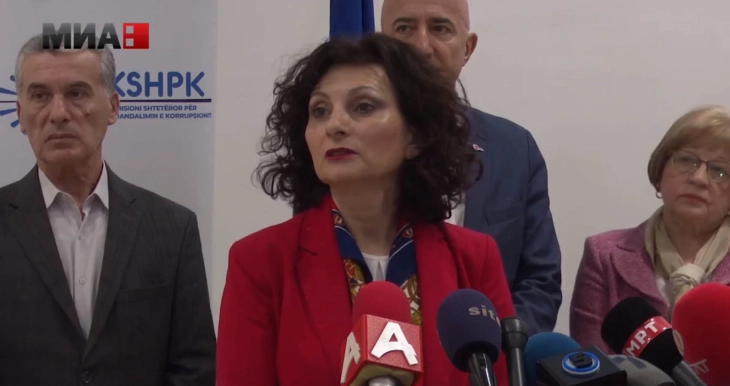Out of 56 criminal prosecution initiatives not a single one has been processed, says Anti-Corruption Commission
- During its five-year mandate, the State Commission for the Prevention of Corruption (SCPC) has formed a total of 2872 cases, 2788 of which were upon reports from the field of prevention of corruption, while 84 have been formed upon the Commission’s own initiative. The Commission solved 2451 cases, submitting 59 initiatives for the determining of responsibility of officials and individuals holding managing posts, as well as 56 initiatives for the initiation of criminal prosecution procedures. Not a single initiative for the initiation of criminal prosecution has been processed, said the President of the SCPC Biljana Ivanovska at a media briefing Wednesday ahead of the end of the Commission’s term.
- Post By Angel Dimoski
- 14:56, 31 January, 2024

Skopje, 31 January 2024 (MIA) – During its five-year mandate, the State Commission for the Prevention of Corruption (SCPC) has formed a total of 2872 cases, 2788 of which were upon reports from the field of prevention of corruption, while 84 have been formed upon the Commission’s own initiative. The Commission solved 2451 cases, submitting 59 initiatives for the determining of responsibility of officials and individuals holding managing posts, as well as 56 initiatives for the initiation of criminal prosecution procedures. Not a single initiative for the initiation of criminal prosecution has been processed, said the President of the SCPC Biljana Ivanovska at a media briefing Wednesday ahead of the end of the Commission’s term.
“Out of all the criminal prosecution initiatives that we have delivered to the public prosecutor’s offices, not a single prosecution decision has reached court, not only from this composition of the Commission but since the Commission’s establishment in 2002 onwards, except for the ‘Bachilo’ case. That’s a total of over 200 criminal prosecution initiatives that have been issued by this institution in the past twenty years or so,” said Ivanovska.
Asked what steps need to be taken in order to change the current situation, Ivanovska said the question should be directed at the judicial bodies, where, she said, fundamental changes are needed, adding that every institution should do the work it is in charge of.
“What is lacking is the implementation of our decisions, but also of the decisions of the independent bodies. The European Commission’s Report repeats a single recommendation every year – the institutions should act upon the initiatives, upon the recommendations of independent bodies, in order to ensure that cases receive a conclusion. With the adoption of a Criminal Code within 24 hours, which reduced penalties, with the scrapping of over 200 cases, and with a public trust in the judiciary of one percent, the results are what we are seeing. So, first of all, we need to be clear whether we want a sincere fight against corruption, or just a declarative one,” said Ivanovska.
Asked what they are most satisfied about in their work, Ivanovska pointed to the 56 initiatives for criminal prosecution and the 59 initiatives for determining responsibility of officials and individuals in managing positions, which practically, she said, are initiatives for the dismissal of high officials.
“They all concern high profiles of officials, and they are all propped up by evidence that the Prosecution should have taken into account, instead of treating them like reports filed by ordinary citizens. Because these findings are founded upon audit reports. We are also proud of all initiatives to the Constitutional Court even though they were dismissed – the initiative against a former president was also sound, as well as the initiative over ‘Bechtel-Enka’ and the fast-tracked adoption of the law, since it violates the Constitution. But, this is how the country works, and it should change as soon as possible,” said Ivanovska.
The SCPC President said the Commission could have done a lot more if the necessary conditions for their work were fulfilled sooner.
On whether they faced pressures or threats, she said they haven’t had such situations, noting that their public position was in a way a shield against such attempts. According to Ivanovska, the pressure was public, such as the press releases of three deputy prime ministers who commented on SCPC findings, as well as the Public Prosecutor’s Office statement that it ceases cooperation. “We’ve provided public responses to all publicly expressed forms of pressure,” said Ivanovska.
At the press conference, Commission member Nuri Bajrami said it is evident that “the politics in the country lacks a will to reform, since the institutions serve to reward partisan members by appointing them to managing posts”.
On occasion of the end of the SCPC’s term, the Commission’s President voiced satisfaction that they managed to secure the premises and staff capacities necessary for their work. She also noted that the Commission’s budget has also been increased, mainly as a result of the assistance provided by international organizations.
The current composition of the SCPC will hold one more session on Monday ahead of the end of its term. The new composition of the Commission, which was elected by Parliament, will assume its duties on February 8.
Photo: Printscreen







